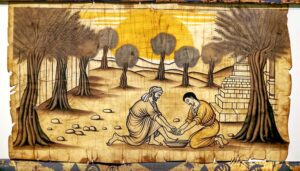Pitch Meaning in the Bible: Protection and Covenant
In the Bible, pitch, a tar-like substance, is symbolically and practically significant, primarily appearing in the stories of Noah’s Ark and Moses’ basket. In Genesis 6:14, pitch guarantees the Ark’s waterproofing, embodying divine providence and protection during the Flood.
Similarly, in Exodus 2:3, Moses’ mother uses pitch to safeguard him, hinting at divine deliverance. The Hebrew term ‘kopher’ also symbolizes atonement and covering, reflecting spiritual and physical safeguarding.
Continued exploration reveals deeper theological connections between pitch and God’s covenantal promises and protection throughout biblical narratives.
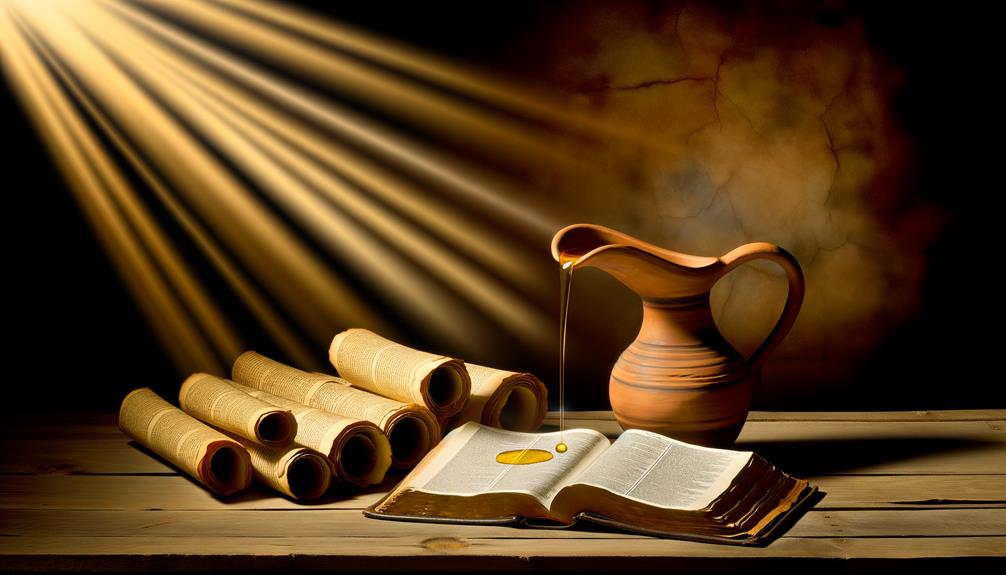
Pitch Meaning in the Bible: Symbol of Protection, Atonement, and Divine Covering
| Aspect | Details |
|---|---|
| Definition | A tar-like substance used for waterproofing or sealing |
| Biblical References | Genesis 6:14 (Noah’s Ark), Exodus 2:3 (Moses’ basket) |
| Hebrew Word | Kopher – also related to the concept of atonement or ransom |
| Symbolism | Represents divine protection, preservation from judgment, and spiritual covering |
| Spiritual Lesson | Reminds believers of God’s provision and the atoning work that shields from destruction |
Biblical Definition of Pitch

In biblical terminology, ‘pitch’ refers to a substance, often bitumen or tar, used for waterproofing and sealing, as mentioned in the construction of Noah’s Ark and the basket of baby Moses.
Historically, pitch was a common material in ancient civilizations for its adhesive and protective properties. Theologically, its use in these narratives underscores divine providence and human ingenuity.
The Hebrew word for pitch, ‘kopher,’ also carries connotations of atonement and covering, providing deeper symbolic resonance. This duality of physical and spiritual safeguarding reflects the Bible’s layered meanings, where practical elements serve as metaphors for divine protection and covenant.
Pitch in Noah’s Ark

Central to the construction of Noah’s Ark, pitch served as an essential waterproofing agent, ensuring the vessel’s integrity amidst the deluge. In Genesis 6:14, God instructs Noah to coat the ark ‘inside and out with pitch,’ highlighting its significant role in the ark’s design.
This application of pitch, a resinous substance, provided necessary impermeability, safeguarding Noah’s family and the animal species during the forty days and nights of relentless rain.
Historically, pitch was commonly used in ancient shipbuilding for its adhesive and sealing properties.
Theologically, the use of pitch signifies divine providence, as it was God who provided the specific instructions for constructing a vessel capable of withstanding the catastrophic floodwaters, and so preserving life and ensuring continuity.
Symbolism of Pitch
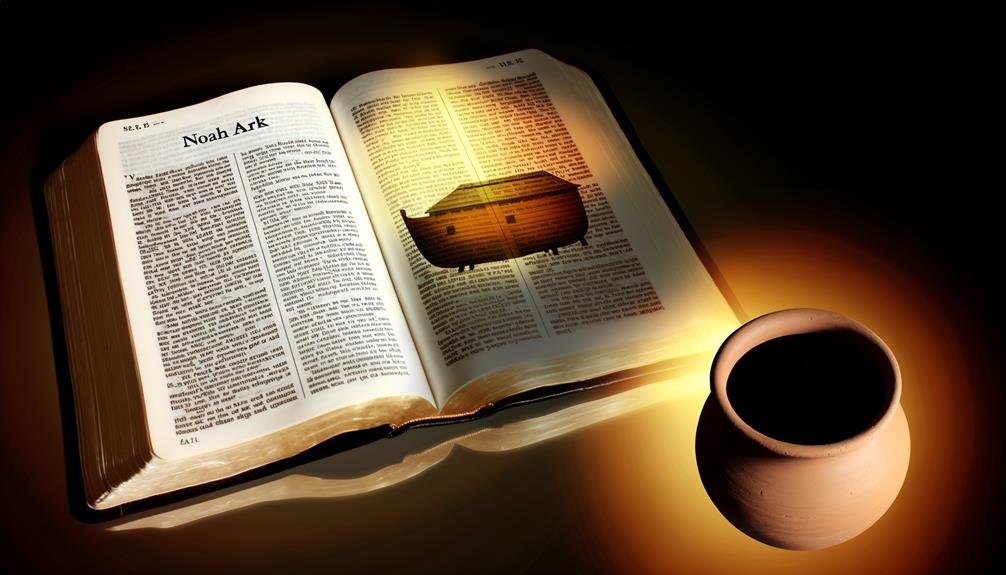
The symbolism of pitch in the Bible extends beyond its practical use in construction to embody profound theological themes. As a substance that guarantees protection and preservation, pitch underscores God’s covenant and promise to safeguard His people, evident in its use in Noah’s Ark.
In addition, pitch serves as a proof of divine craftsmanship, illustrating how God’s meticulous care permeates His creations and covenants.
Protection and Preservation
Although often overlooked, pitch in the Bible serves as a potent symbol of protection and preservation, most notably illustrated through its use in the construction of Noah’s Ark and Moses’ basket.
Historically, pitch was used as a waterproofing agent, ensuring the safety and longevity of these vessels amidst perilous waters. Theologically, pitch symbolizes God’s providence and care, safeguarding His chosen ones from destruction.
| Aspect | Symbolism |
|---|---|
| Noah’s Ark | Divine protection from the flood |
| Moses’ Basket | Preservation of Moses’ life |
| Waterproofing | Ensuring survival and continuity |
| Divine Providence | God’s intervention in human affairs |
| Preservation of Faith | Sustaining the lineage of God’s people |
This multilayered significance underscores pitch as a divine instrument of salvation and continuity in biblical narratives. Through the melodies of sacred hymns and the solemnity of chants, pitch transcends mere sound, inviting the faithful into a deeper communion with the divine. This interplay of music and spirituality often reflects the struggles of individuals wrestling with faith in scripture, as they seek harmony between their doubts and beliefs. Ultimately, pitch becomes a vessel for expressing the complexities of both divine assurance and human uncertainty in the journey of faith.
Covenant and Promise
Building upon the theme of protection and preservation, pitch also embodies the theological concepts of covenant and promise, reflecting God’s enduring commitment to His people.
In Genesis, Noah’s ark, sealed with pitch, represents a divine covenant of salvation against the deluge, symbolizing God’s assurance of safety and continuity. Similarly, the basket of baby Moses, coated with pitch, signifies a promise of deliverance and future leadership for Israel.
This use of pitch as a sealing agent underscores the binding nature of divine promises, ensuring their fulfillment. Historically, pitch’s impermeability parallels the unbreakable bond between God and His followers, offering a tangible representation of spiritual covenants that withstand trials and tribulations, hence affirming God’s unwavering faithfulness.
Divine Craftsmanship
Pitch, as utilized in biblical texts, serves not only as a practical material but also as a profound symbol of divine craftsmanship, embodying God’s meticulous care and purposeful design in the creation and preservation of His works.
Historically, pitch was employed to waterproof Noah’s Ark (Genesis 6:14), signifying divine protection and the preservation of life amidst chaos. Theologically, this use of pitch reflects God’s intent to safeguard and sustain His covenant with humanity.
Additionally, in Moses’ story, the pitch-lined basket (Exodus 2:3) symbolizes divine intervention and providence, ensuring his survival.
Consequently, pitch transcends its physical properties, representing a deeper theological truth about God’s active role in shaping and safeguarding His creation.
Pitch in Ancient Practices
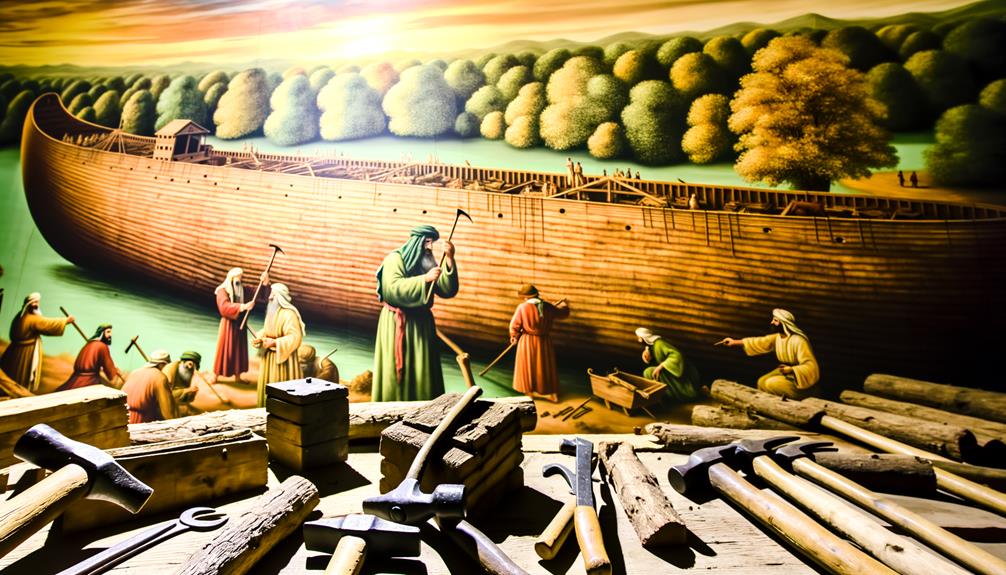
In ancient practices, pitch was a versatile and essential material used for various purposes, including waterproofing vessels and construction. Historical evidence showcases pitch’s significance in maintaining structural integrity and durability in various ancient civilizations.
Its application extended to sealing pottery and waterproofing boats, guaranteeing longevity and functionality. Theologically, pitch symbolizes protection and preservation, reflecting divine safeguarding in biblical narratives. Ancient techniques involved extracting pitch through a meticulous process of heating and refining natural resins.
Here is a brief overview:
| Ancient Use | Application | Significance |
|---|---|---|
| Waterproofing | Boats and vessels | Guaranteed longevity and seaworthiness |
| Construction | Buildings | Enhanced durability and weatherproofing |
| Pottery Sealing | Storage containers | Preserved contents from spoilage |
| Symbolic Meaning | Religious artifacts | Represented divine protection |
| Extraction Process | Heating and refining | Labor-intensive, showcasing expertise |
Understanding pitch’s multifaceted role underscores its importance in ancient practices.
Pitch in the Book of Exodus

The use of pitch in the Book of Exodus serves as a critical element in the narrative of Moses’ early life, symbolizing divine protection and the preservation of God’s chosen leader.
In Exodus 2:3, Moses’ mother places him in a papyrus basket coated with pitch and tar, ensuring it is waterproof and capable of floating on the Nile. This act of safeguarding Moses with pitch reflects a profound theological motif: God’s providence in perilous circumstances.
Historically, pitch was a common waterproofing agent, emphasizing the practical ingenuity of Moses’ mother. Theologically, the pitch signifies God’s intervention, foreshadowing Moses’ future role in delivering the Israelites.
Consequently, pitch in Exodus represents both immediate physical safety and the broader divine plan of salvation.
Spiritual Implications of Pitch

While often overlooked as a mere practical detail, the use of pitch in biblical narratives carries profound spiritual symbolism, representing God’s protective care and the guarantee of His promises throughout the unfolding of salvation history.
Historically, pitch was used to waterproof vessels, as seen in Noah’s Ark and Moses’ basket. Theologically, it signifies separation from chaos and divine judgment, reflecting God’s covenantal faithfulness.
The pitch that sealed Noah’s Ark preserved life amidst the flood, symbolizing salvation and new beginnings. Similarly, the pitch-coated basket of baby Moses facilitated his survival, prefiguring Israel’s deliverance from Egypt.
Consequently, pitch transcends its material function, embodying divine security and the fulfillment of God’s redemptive plan in Scripture.
Pitch and Divine Protection

Examining the role of pitch further, its use in biblical texts not only underscores God’s covenantal faithfulness but also illustrates a tangible manifestation of divine protection in moments of profound vulnerability.
In Genesis 6:14, Noah is instructed to cover the ark with pitch, sealing it from the destructive floodwaters, symbolizing God’s safeguarding of the righteous. Similarly, in Exodus 2:3, Moses’ mother places him in a basket daubed with pitch, ensuring his survival amidst Pharaoh’s deadly decree.
These instances reflect a theological motif where pitch serves as a divine instrument, providing physical security and reaffirming God’s providential care. Hence, pitch becomes a conduit through which divine intervention is both enacted and experienced in biblical narratives.
Pitch in Historical Context
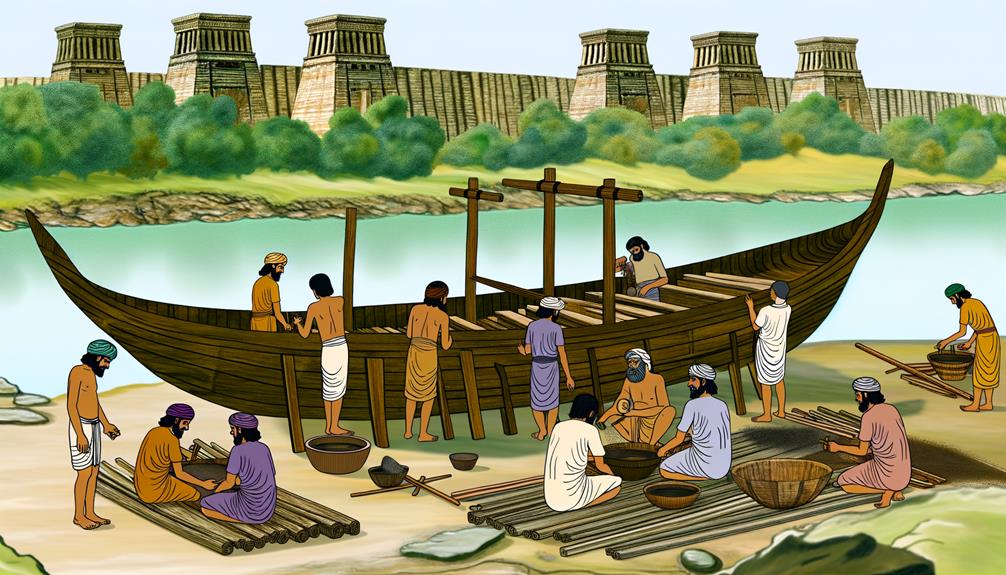
Delving into the historical context of pitch, one finds that its application in ancient civilizations extended beyond mere utility, embodying significant cultural and theological connotations.
In Mesopotamian societies, pitch was often used in construction, particularly in the waterproofing of buildings and boats, symbolizing protection and preservation. This material, derived from natural bitumen, was also employed in ritualistic practices, signifying purification and sanctity.
Theological narratives, such as the story of Noah’s Ark in the Bible, further illustrate pitch’s metaphorical essence as a divine safeguard against chaos and destruction. By sealing the Ark with pitch, the narrative underscores God’s providence and the material’s role in ensuring the survival of life and continuity of divine promises.
Modern Interpretations of Pitch

How has the understanding of pitch evolved in contemporary theological and scholarly discourse, reflecting both its ancient significance and modern symbolic interpretations?
Today, scholars recognize pitch as more than a mere substance used for waterproofing in ancient times. Modern interpretations often view pitch symbolically, representing themes of preservation and divine protection.
Theologically, pitch is seen as a metaphor for God’s safeguarding presence, as evidenced in the narrative of Noah’s Ark. Furthermore, in ecological theology, pitch is sometimes discussed in the context of natural resources and human stewardship.
This evolving understanding bridges the historical use of pitch with contemporary concerns, enriching its biblical significance and offering deeper insights into its spiritual and practical applications.
Lessons From Pitch in Scripture

The multifaceted lessons derived from the use of pitch in Scripture highlight its significance in narratives such as Noah’s Ark, where it serves as a tangible symbol of divine protection and covenantal faithfulness.
Historically, pitch was essential for waterproofing, ensuring the Ark’s integrity amidst the deluge. Theologically, this underscores God’s meticulous provision and the importance of human obedience to divine instructions.
Additionally, pitch’s use in Moses’ basket (Exodus 2:3) mirrors themes of deliverance and preservation. These instances reflect broader biblical motifs of salvation and trust in God’s promises.
Consequently, pitch is not merely a practical material but a profound emblem of God’s unwavering care and the fulfillment of His covenantal assurances throughout biblical history.
Conclusion
The biblical concept of pitch transcends its physical manifestation as a waterproofing substance; it symbolizes divine protection and providence.
In Noah’s Ark, pitch serves as a shield against chaos, embodying God’s covenant. Its use in ancient practices and the Book of Exodus highlights its role in safeguarding the faithful.
Historically, pitch signifies resilience and divine care, offering profound theological insights. Modern interpretations continue to affirm its timeless message of security and divine guardianship.


